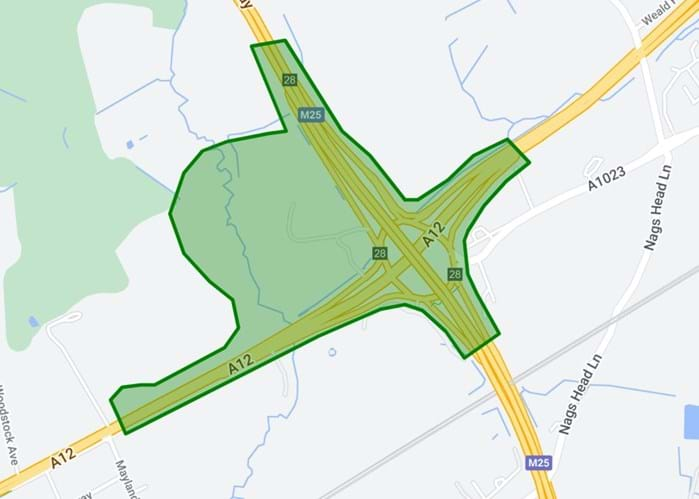M25 junction 28 improvements
Upgrading junction 28 of the M25 between the M25 and the A12 in Essex.
Stick to our diversions to avoid ULEZ fees
We plan our road road closures with Transport for London (TFL).
Together, we make sure ULEZ cameras don't operate on our signed diversion routes.
If you don't use our official signed diversion routes, you may need to pay the ULEZ fee.
Latest updates
-
16 June 2025
M25 Junction 28 upcoming closures
Our next closures of the southern side of the M25 junction 28 and Brook Street roundabout will be:
Weeknight closures - Wednesday 18 and Thursday 19 June
Closed overnight (10pm to 5am) each night.
Weekend closure - Friday 20 to Monday 23 June
We'll start the closure at 11pm Friday 20 June and lift it by 5am Monday 23 June.
Diversions
Signed diversion will be in place:
To exit the M25 anticlockwise
- leave the anticlockwise carriageway at Junction 29
- join the A127, travel to Gallows Corner and join the A12 eastbound
To join the M25 clockwise
- continue on the A12 to Gallows Corner
- join the A127 and join the M25 at junction 29
To leave the A12 to Brentwood
Leave the A12 at junction 12 (Shenfield) and join the A1023.
The Brook Street roundabout will only be open for two traffic movements during the closure:
- traffic leaving the A12 eastbound to the M25 anticlockwise
- traffic leaving the M25 clockwise travelling to the A12 eastbound
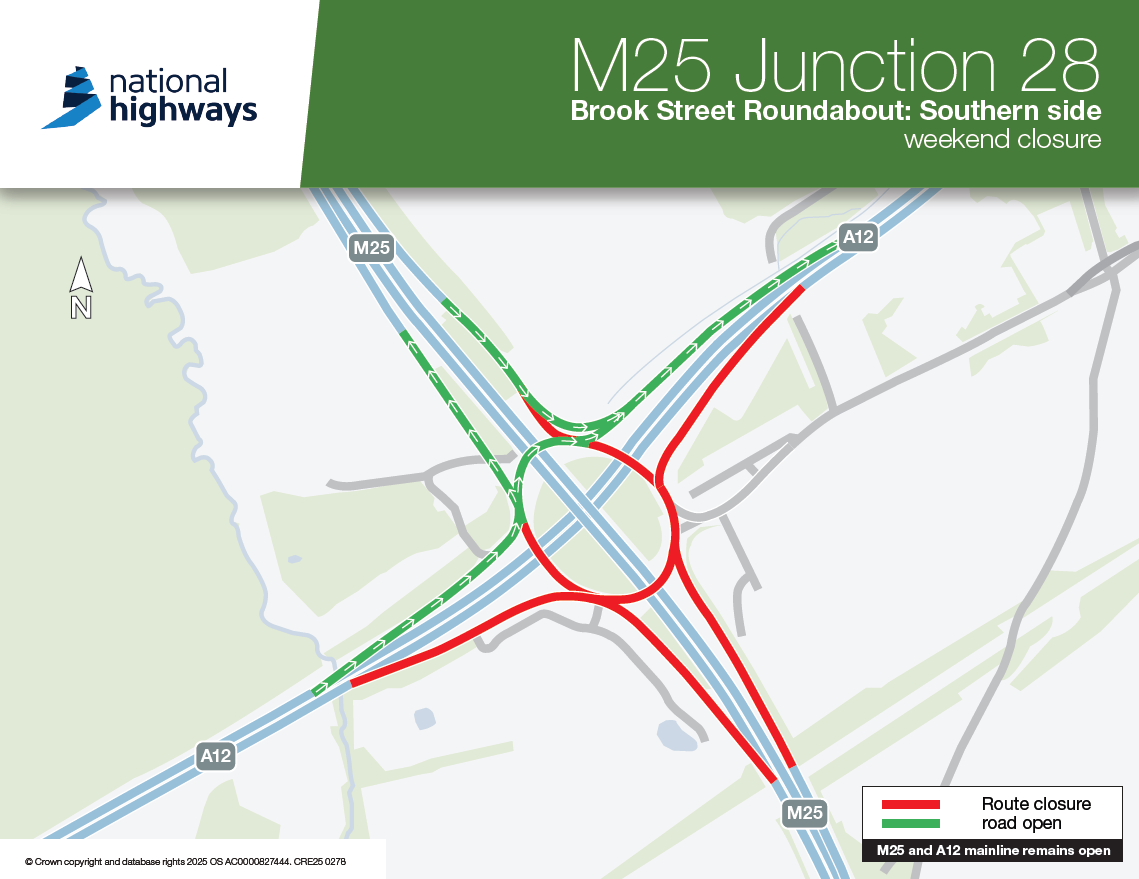
Diagram of Brook Street Roundabout southern side weekend closure Stick to official signed diversions
When planning our road closures, we liaise with Transport for London (TFL) to ensure ULEZ cameras aren't operating along the signed diversion route. However, if you decide to leave our official signed diversion route during closures, you may still need to pay the ULEZ fee.
M25 anticlockwise junction 28 entry slip overnight closures - Monday 23 and Tuesday 24 June
Closed overnight (10pm to 5am) to install new technology.
Diversion
To join the M25 anticlockwise:
- join the clockwise carriageway at junction 28
- use junction 29 to return on the anticlockwise carriageway
Please remember that closures can change at short notice. You can check the latest information on our daily closures page or find live travel information on our Traffic England site. Our travel alerts give details of live incidents on our network.
-
09 June 2025
M25 Junction 28 / Brook Street Roundabout weekend closures
We'll need to close the M25 Junction 28 Brook Street roundabout for a series of weekends while we:
- make utility diversions
- do resurfacing work including white lining
We'll close the roundabout in two halves to cause as little disruption as possible.
Our next closure will be on the northern side of the roundabout from 11pm Friday 13 June to 5am Monday 16 June.
We'll give you further closures dates in the coming weeks.
Diversion
During these closures, a signed diversion will be in place:
To access the Brook Street roundabout from the A12 eastbound
- continue on the A12 and exit at junction 12 (Shenfield)
- return on the A12 westbound where you can access the Brook Street roundabout
To access the A12 westbound from the M25 clockwise
- continue to junction 29
- return on the anticlockwise carriageway where you can exit at junction 28
To access the A12 eastbound from the A12 westbound
- turn around at Gallows Corner
- return on the A12 eastbound
To join the M25 anticlockwise from the A12
- travel to Gallows Corner on the A12 westbound
- join the A12 Eastern Avenue, the A406 and the M11
- join the M25 at junction 27
The Brook Street roundabout will only be open for 4 traffic movements over the weekend:
- leaving the M25 anticlockwise to join the A12 westbound
- leaving the A12 westbound to the M25 clockwise
- leaving the A12 westbound to the A1023 (Brentwood)
- leaving the A12 westbound to rejoin the A12 if you leave the carriageway by mistake
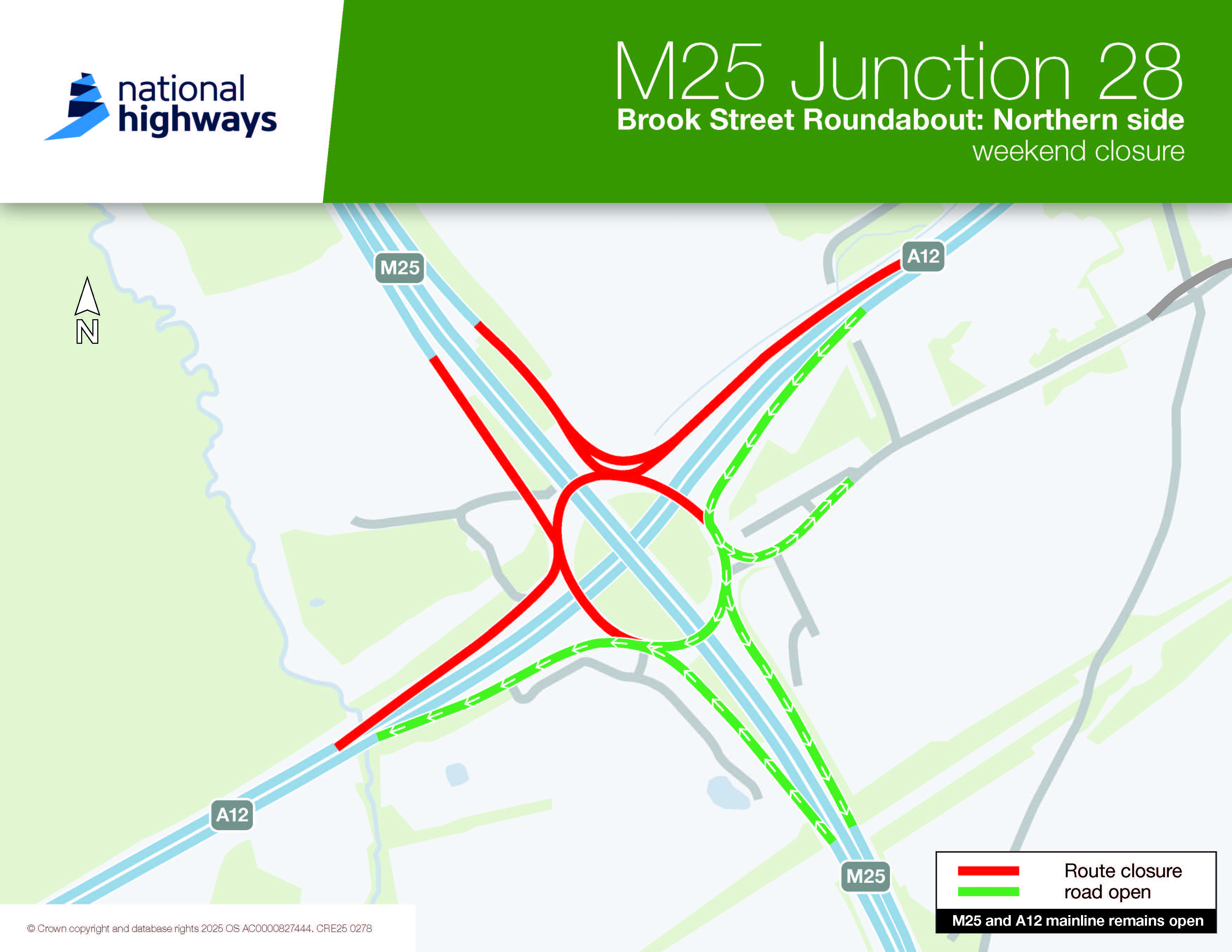
M25 J28 Brook Street roundabout northern side map
Stick to official signed diversions
When planning our road closures, we liaise with Transport for London (TFL) to ensure that the ULEZ cameras aren't in operation along the signed diversion route. However, if you decide to leave our official signed diversion route during closures, you may still need to pay the ULEZ fee.
Please remember that closures can change at short notice. You can check the latest information on our daily closures page or find live travel information on our Traffic England site. Our travel alerts give details of live incidents on our network.
-
03 June 2025
A12 westbound night closures
We will be removing our temporary vehicle safety barrier and any temporary road markings on the A12 over two consecutive nights. To facilitate these works, the A12 westbound will be closed from 10pm-5am on Monday 02 June and Tuesday 03 June.
Due to the nature of these works, there will be some noise disturbance, and we would like to apologise in advance for this and thank you for your patience and understanding.
The road will be closed from the M25 junction 28 interchange and Maylands Way. Access for residents will be permitted during the closure.
During the closure a diversion will be in place by leaving the A12 at the M25 J28, joining the M25 clockwise to junction 29, and joining the A127 westbound, where traffic can rejoin the A12 at Gallows Corner.
-
16 May 2025
Our next weekend and overnight closures
While we continue the work on upgrading the M25 Junction 28 and Brook Street roundabout, we're coming up to the next series of planned closures. These works include carrying out utility diversions and resurfacing works, including white lining. We'll close the roundabout in two halves to cause as little disruption as possible.
Below are the two confirmed closure dates on the southern side of the roundabout:
- 11pm Friday 16 May to 5am Monday 19 May.
- 11pm Friday 30 May to 5am Monday 02 June.
We'll update this page with further closure dates in the coming weeks.
During these closures, a signed diversion will be in place:
- To exit the M25 anticlockwise – Please leave the anticlockwise carriageway at Junction 29 and join the A127, travel to Gallows Corner and join the A12 eastbound.
- To Join the M25 clockwise – Please continue on the A12 to Gallows Corner, join the A127 and join the M25 at junction 29.
- To leave the A12 to Brentwood – Please leave the A12 at junction 12 (Shenfield) and join the A1023.
The Brook Street roundabout will only be open for two traffic movements during the closure:
- Traffic leaving the A12 eastbound to the M25 anticlockwise.
- Traffic leaving the M25 clockwise travelling to the A12 eastbound.

Diagram of Brook Street Roundabout southern side weekend closure M25 anticlockwise overnight closures
The M25 anticlockwise carriageway between junctions 28 and 27 will be closed for 3 nights while we carry out works to the vehicle safety barrier, and overhead gantries. The road will be closed from 10pm to 5am each night on Monday 19, Tuesday 20 and Wednesday 21 May.
During the closure, a diversion will be in place:
- by leaving the M25 anticlockwise at junction 28,
- and follow the signed diversion via the A12, Gallows Corner, Eastern Avenue, A406 and M11 to re-join the M25 at junction 27.
A12 eastbound overnight closures
The A12 eastbound between Gallows Corner and the M25 junction 28 interchange will be closed for two nights while we carry out resurfacing. The road will be closed from 10pm to 5am each night on Thursday 22 and Friday 23 May.
During the closure, a diversion will be in place:
• via the A127, joining the M25 anticlockwise at junction 29, leaving the M25 at junction 28, and rejoining the A12.
• For non-motorway traffic, please use the A127, Squirrels Heath Road, Shepherds Hill, and Nags Head Lane.A12 eastbound overnight closures
The A12 eastbound between the M25 J28 interchange and the A12 J12 (Shenfield) will be closed for two nights while we carry out resurfacing works to the carriageway. The road will be closed from 10pm-5am each night on Tuesday 27 and Wednesday 28 May.
During the closure, a signed diversion will be in place:
- via Gallows Corner, the A127, the A130 and rejoining the A12 at J17.
M25 anticlockwise ‘Up and Over’ Overnight closures
The M25 anticlockwise will be closed between the exit and entry slips at junction 28 for 7 nights in the coming weeks while we carry out works to the new M25 to A12 dedicated loop road. These closures will be in place on each of the following nights:
- 10pm Tuesday 27 to 5am Thursday 29 May
- 10pm Tuesday 03 to 5am Friday 06 June
During these closures, a diversion will be in place:
- By leaving the carriageway at junction 28 and using the Brook Street roundabout to re-join the carriageway.
When planning our road closures, the team liaises with Transport for London (TFL) to ensure that the Ultra Low Emission Zone (ULEZ) cameras are not in operation along the signed diversion route. However, if drivers decide to leave our official signed diversion route during closures, they may still need to pay the ULEZ fee.
-
09 May 2025
Overnight and weekend closures
M25 Junction 28 / Brook Street roundabout weekend closures
We'll need to close the M25 J28 / Brook Street roundabout for a series of weekends while we carry out utility diversions and resurfacing works, including white lining. We'll close the roundabout in two halves to cause as little disruption as possible.
Our next closure will be on the northern side of the roundabout from 11pm Friday 9 May to 5am Monday 12 May. We will update this page with further closure dates in the coming weeks.
During these closures, a signed diversion will be in place:
- To access the Brook Street roundabout from the A12 eastbound, please continue on the A12 and exit at junction 12 (Shenfield), return on the A12 westbound where you can access the Brook Street roundabout.
- To access the A12 westbound from the M25 clockwise, please continue to junction 29 to return on the anticlockwise carriageway where you can exit at junction 28.
- To access the A12 eastbound from the A12 westbound, please turn around at Gallows Corner to return on the A12 eastbound.
- To join the M25 anticlockwise from the A12 please travel to Gallows Corner on the A12 westbound, join the A12 Eastern Avenue, the A406 and the M11 to join the M25 at junction 27.

M25 J28 Brook Street roundabout northern side map
The Brook Street roundabout will only be open for four traffic movements over the weekend. These will be:
- leaving the M25 anticlockwise to join the A12 westbound
- leaving the A12 westbound to the M25 clockwise
- leaving the A12 westbound to the A1023 (Brentwood)
- leaving the A12 westbound to rejoin the A12 if a driver leaves the carriageway by mistake
When planning our road closures, the team liaises with Transport for London (TFL) to ensure that the ULEZ cameras are not in operation along the signed diversion route. However, if drivers decide to leave our official signed diversion route during closures, they may still need to pay the ULEZ fee.
M25 Junction 28 / Brook Street roundabout: closure on southern side of roundabout
While we continue the work on upgrading the M25 Junction 28 and Brook Street roundabout, we are coming up to the next series of planned closures. These works include carrying out utility diversions and resurfacing works, including white lining. We will close the roundabout in two halves to cause as little disruption as possible.
There will be a closure on the southern side of the roundabout from 11pm Friday 16 May to 5am Monday 19 May. We will update this page with further closure dates in the coming weeks.
During these closures, a signed diversion will be in place:- To exit the M25 anticlockwise – Please leave the anticlockwise carriageway at Junction 29 and join the A127, travel to Gallows Corner and join the A12 eastbound.
- To Join the M25 clockwise – Please continue on the A12 to Gallows Corner, join the A127 and join the M25 at junction 29.
- To leave the A12 to Brentwood – Please leave the A12 at junction 12 (Shenfield) and join the A1023.
The Brook Street roundabout will only be open for two traffic movements during the closure:
- Traffic leaving the A12 eastbound to the M25 anticlockwise.
- Traffic leaving the M25 clockwise travelling to the A12 eastbound.
When planning our road closures, the team liaises with Transport for London (TFL) to ensure that the ULEZ cameras are not in operation along the signed diversion route. However, if a driver decides to leave our official signed diversion route during closures, they may still need to pay the ULEZ fee.

M25 anticlockwise junctions 28 to 27 overnight closures
The M25 anticlockwise between junctions 28 and 27 will be closed for three nights for resurfacing works to the new M25 to A12 dedicated loop road.
The road will be closed from 10pm-5am each night from Monday 19 May to Wednesday 21 May.
Diversion
To continue on the M25 anticlockwise, please exit the carriageway at junction 28 and follow the signed diversion via the A12, Gallows Corner, Eastern Avenue, A406 and M11 to re-join the M25 at junction 27.
M25 Junction 28 overnight closures
The M25 anticlockwise will be closed for three nights between the exit and entry slips at junction 28 while we move vehicle safety barriers.
The closures will be from 10pm to 5am each night from Tuesday 27 May to Thursday 29 May.
Diversion
To continue on the M25 anticlockwise, please leave at junction 28 and use the Brook Street roundabout to re-join the anticlockwise carriageway.
When planning our road closures, the team liaises with Transport for London (TFL) to ensure that the Ultra Low Emission Zone (ULEZ) cameras are not in operation along the signed diversion route. However, if drivers decide to leave our official signed diversion route during closures, they may still need to pay the ULEZ fee.
-
25 April 2025
Forthcoming closures
M25 Junction 28 / Brook Street Roundabout weekend closures
We will need to close the M25 J28 / Brook Street roundabout for a series of weekends while we carry out utility diversions and resurfacing, including white lining. We will close the roundabout in two halves to cause as little disruption as possible.
Our next closure will be on the northern side of the roundabout from 11pm Friday 25 April to 5am Monday 28 April. We will communicate further closures dates in the coming weeks.
To see which parts of the roundabout will be open or closed, view our Brook Street weekend closure diagram.
Diversions
During these closures, a signed diversion will be in place:
- To access the Brook Street roundabout from the A12 eastbound, please continue on the A12 and exit at junction 12 (Shenfield), return on the A12 westbound where you can access the Brook Street roundabout.
- To access the A12 westbound from the M25 clockwise, please continue to junction 29 to return on the anticlockwise carriageway where you can exit at junction 28.
- To access the A12 eastbound from the A12 westbound, please turn around at Gallows Corner to return on the A12 eastbound.
- To join the M25 anticlockwise from the A12 please travel to Gallows Corner on the A12 westbound, join the A12 Eastern Avenue, the A406 and the M11 to join the M25 at junction 27.
The Brook Street roundabout will only be open for four traffic movements over the weekend, these will be:
- Leaving the M25 anticlockwise to join the A12 westbound
- Leaving the A12 westbound to the M25 clockwise
- Leaving the A12 westbound to the A1023 (Brentwood)
- Leaving the A12 westbound to rejoin the A12 if a driver leaves the carriageway by mistake
When planning our road closures, the team liaises with Transport for London (TFL) to ensure that the Ultra Low Emission Zone (ULEZ) cameras are not in operation along the signed diversion route. However, if drivers decide to leave our official signed diversion route during closures, they may still need to pay the ULEZ fee.
Overnight closures in May
The M25 anticlockwise will be closed for three nights between the exit and entry slips at junction 28 while we move vehicle safety barriers.
The closures will be from 10pm to 5am each night from Tuesday 6 May to Thursday 8 May.
Diversion
To continue on the M25 anticlockwise: please leave at junction 28 and use the Brook Street roundabout to re-join the anticlockwise carriageway.
-
16 April 2025
More closures in April
Overnight closures
The M25 anticlockwise will be closed for two nights between the exit and entry slips at junction 28 while we move vehicle safety barriers.
The closures will be from 10pm to 5am on Tuesday 22 April and Wednesday 23 April.
Diversion
To continue on the M25 anticlockwise:
- please leave at junction 28 and use the Brook Street roundabout to re-join the anticlockwise carriageway.
Key achievements so far this year
The improvements project is steadily progressing towards completion in late summer 2025, with significant milestones achieved early this year.
Key achievements:
January: New M25 anticlockwise entry slip road opened:
- The newly-constructed entry slip road from the Brook Street roundabout to the M25 anticlockwise carriageway is now open.
- This extended slip road provides increased visibility and allows merging traffic to reach National Speed Limit over a greater distance, improving safety and traffic flow.
March: A12 eastbound off slip road opened:
- The new 800-metre-long off slip road from the A12 eastbound to the Brook Street roundabout is now open.
- This allows us to demolish the old A12 off slip and build the new loop road from the M25 anticlockwise to the A12 eastbound.
Non-Motorised User (NMU) improvements:
- As a part our improvement scheme, we are upgrading the existing NMU footpath between Harold Wood and Brentwood. These upgrades include widening the path along the A12, including the corner of Maylands Way.
- The first section of the NMU route at the entrance to Maylands Way is nearing completion, with kerbing and initial Tarmac layers laid. Final surfacing is scheduled for the coming weeks.
- Preparatory work, including breaking up the existing footpath, has begun for widening and kerbing along the route towards the Brook Street roundabout.
- We currently have a lane closed on the Brook Street roundabout and the A12 westbound entry slip road for safety, due to the proximity to the live carriageway.
Upcoming works:
The project team is now focused on completing the remaining key components of the scheme:
- Construction and opening of the new M25 anticlockwise to A12 eastbound dedicated loop: This new loop road is designed to significantly improve traffic flow between the M25 and A12 eastbound.
- Completion and opening of the improved NMU Route: The enhanced pedestrian and cyclist route will provide safer and more efficient connectivity.
- Complete resurfacing and white lining of the Brook Street Roundabout: This work will include improving the surface quality, traffic signals and lane markings, enhancing safety and traffic flow.
- Opening of the new A12 eastbound off slip road to the Brook Street Roundabout: This will increase capacity and reduce congestion.
The scheme is on track to deliver a more efficient and safer transportation network for all road users.
-
02 April 2025
Anticlockwise overnight closure
The M25 anticlockwise will be closed for one night from 10pm Thursday 3 April to 5am Friday 4 April between the exit and entry slips at junction 28 while we move vehicle safety barriers.
Diversion
To continue on the M25 anticlockwise, please leave at junction 28 and use the Brook Street roundabout to re-join the anticlockwise carriageway.
A12 eastbound closures in April
As work progresses on the new A12 loop road, we need to do some resurfacing to complete these works.
While we work, we'll close the A12 eastbound underneath the M25 junction 28 and Brook Street roundabout on these dates:
- 10pm Friday 4 April to 5am Monday 7 April
- 10pm Friday 11 April to 5am Monday 14 April
Diversion
To continue on the A12 eastbound:
- leave the A12 and exit the Brook Street roundabout using the second exit, going up and over the roundabout
Please note: the current lane closure on the A12 westbound on-slip road from the Brook Street roundabout will remain while we continue our improvements to the non-motorised user (NMU) route.
When planning our road closures, the team liaises with Transport for London (TFL) to ensure that the Ultra Low Emission Zone (ULEZ) cameras are not in operation along the signed diversion route. However, if drivers decide to leave our official signed diversion route during closures, they may still need to pay the ULEZ fee.
-
12 March 2025
New slip opens - upcoming traffic management
Earlier in March we opened the new A12 off-slip to Brook Street roundabout. This allows us to:
- demolish the old A12 off slip
- build the new loop road from the M25 anticlockwise to the A12 eastbound
The loop road will pass underneath Maylands Bridge.
We'll need more traffic management as our work proceeds.
M25 Junction 28/Brook Street Roundabout weekend closures - starting March
We'll close the M25 junction 28/Brook Street roundabout for a series of weekends while we:
- divert utilities
- perform resurfacing and white lining
We will close the roundabout in two halves to limit disruption as much as possible.
First closure 11pm Friday 28 March to 5am Monday 31 March
Our first closure will be on the southern side of the roundabout
We'll update this page with further closure dates.
Diversion
During these closures, we'll have a signed diversion:
- To exit the A12 westbound and join the M25: continue to Gallows Corner, then follow the A127 to M25 junction 29
- To exit the M25 anticlockwise: continue to junction 27 following the M11, A406, A12
- To exit the M25 clockwise: continue to junction 29 then follow the A127, A12
A12 eastbound closures in April
To work on the new A12 loop road, we need to do some resurfacing.
While we work, we'll close the A12 eastbound underneath the M25 junction 28 and Brook Street roundabout on these dates:
- 10pm Friday 4 April to 5am Monday 7 April
- 10pm Friday 11 April to 5am Monday 14 April.
Diversion
To continue on the A12 eastbound, leave the A12 and exit the Brook Street roundabout using the second exit, going up and over the roundabout.
When planning our closures, we arrange with Transport for London (TFL) that ULEZ cameras aren't operating on signed diversion routes. However, you may need to pay the ULEZ fee if you leave our official signed diversion routes during closures.
Please remember that closures can change at short notice. You can check the latest information on our daily closures page or find live travel information on our Traffic England. Our travel alerts give details of live incidents on our network.
-
10 March 2025
Another milestone moment
Another significant milestone has been reached in our M25 junction 28 improvement project.
We’ve successfully opened the new A12 off-slip to the Brook Street Roundabout. This stretch of road carries traffic over the newly-built Maylands Bridge from the A12 Eastbound.
This will allow the demolition of the old A12 off slip and final construction of the new, dedicated loop road from the M25 anticlockwise to the A12 eastbound. The loop road will pass underneath Maylands Bridge. This is set to open in the coming months.
Our Project Manager for the scheme Zachary Pepper said:
“The opening of the exit slip road is another milestone in our much-needed improvement scheme. Once complete, the project will improve capacity and driver safety and reduce congestion around the busy junction by improving the connectivity between the M25 and A12.”
Hugh McNally, Grahams Construction Project Manager, said:
“Achieving this key traffic switch onto the newly-realigned A12 eastbound off-slip road via the new Maylands Bridge allows the team to now focus on works to connect the new anti-clockwise loop road from the M25 into the existing A12 eastbound mainline.
“Thanks to all the project team and supply chain for their effort in achieving this key milestone. We look forward to delivering this major infrastructure project in late summer 2025.”
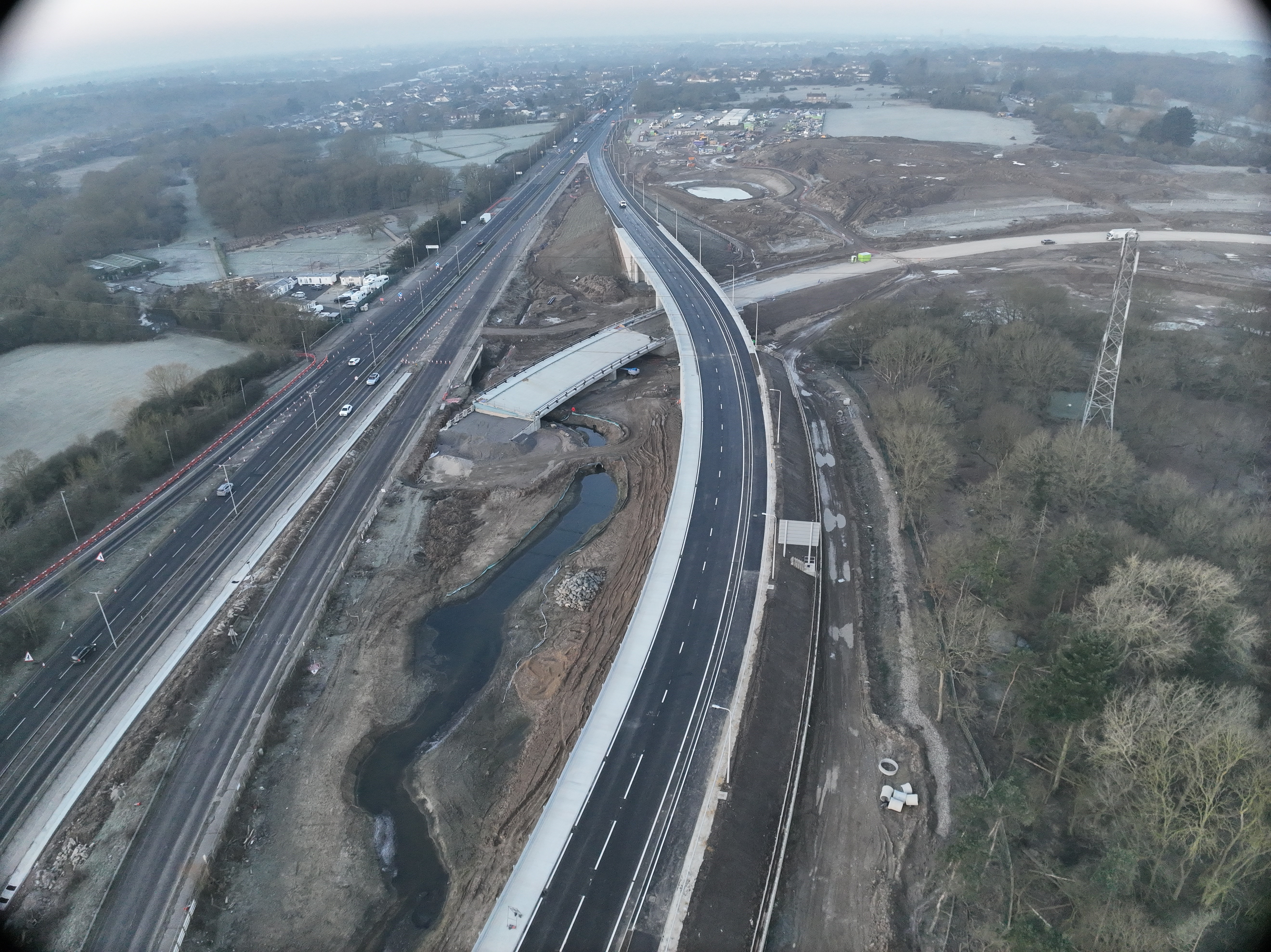
the new A12 off-slip road to the Brook Street Roundabout is in the middle of the photo, crossing over Maylands Bridge -
26 February 2025
Overnight A12 eastbound closure
The A12 eastbound will be closed from Gallows Corner to the M25 junction 28 for one night, from 10pm Wednesday 26 February to 5am Thursday 27 February while we carry out white lining works on the carriageway.
Please note: local residents' access will still be available during this time.
During the closure, a signed diversion will be in place via:
- the A127 and joining the M25 anticlockwise at junction 29, leaving at junction 28.
For non-motorway traffic, a signed diversion will be in place via:
- the A127
- Squirrels Heath Road
- Shepherds Hill
- Nag’s Head Lane
- and Brook Street to return on the A12.
Overnight lane closures
Two out of three lanes of the M25 junction 28 gyratory will be closed for two nights on:
Thursday 27 February and Friday 28 February between 10pm and 5am on the:
- A12 roundabout and approaches while we continue our non motorised user (NMU) upgrade works.
One lane will remain open throughout these works. This will still allow road users to continue their journeys but there may be increased congestion at this time.
Maylands Way closure
We’re improving connectivity for pedestrians and cyclists between Harold Hill and Brentwood by upgrading the non-motorised user (NMU) route.
For safety, we need to close:
- the entrance into Maylands Way from the A12 westbound from 5am Monday 24 February until 5am Saturday 22 March.
- We will also put in a new safety barrier during the closure.
During the closure, access to Maylands Way be available via:
- Harold Court Road
- The exit from Maylands Way onto the A12 will remain open during the closure.
When planning our road closures, the team liaise with Transport for London (TFL) to ensure that the ULEZ cameras are not in operation along the signed diversion route. However, if traffic decides to leave our official signed diversion route during closures, they may still need to pay the ULEZ fee.
-
17 February 2025
Overnight A12 roundabout closures
As work progresses on the upgrade to the A12 roundabout and linking it to the M25 at junction 28, we will need to close parts of the roundabout.
From 10pm Tuesday 18 February to 5am Wednesday 19 February the northern half of the A12 roundabout will be closed to allow the installation of a temporary traffic light system. This will allow us to upgrade the existing signals on the junction.
During the closure, signed diversions will be in place:
- To exit the A12 eastbound: continue to junction 12 and return to junction 28
- To join the A12 eastbound: continue to Gallows Corner and return to junction 28
- To join the M25 clockwise: continue to junction 29 and return to junction 28
- To join the M25 anticlockwise, follow the diversion signs displayed through the A12, A406 and M11
Also, from 10pm Wednesday to 5am Thursday 20 February the southern half of the A12 roundabout will be closed to enable the works mentioned above.
During the closure, signed diversions will be in place:
- To exit the A12 westbound: to join the M25 continue to Gallows Corner, then follow the A127 to M25 junction 29
- To exit the M25 anticlockwise: continue to junction 27 following the M11, A406, A12
- To exit the M25 clockwise: continue to junction 29 then follow the A127, A12
When planning our road closures, the team liaise with Transport for London (TFL) to ensure that the ULEZ cameras are not in operation along the signed diversion route. However, if traffic decides to leave our official signed diversion route during closures, they may still need to pay the ULEZ fee.
-
14 February 2025
Upcoming traffic management
Weekend M25 slip road closure
Work continues on the new A12 eastbound slip road and linking it to the M25 anticlockwise entry slip road.
Closure
From 10pm Friday 14 February to 5am Monday 17 February the M25 anticlockwise entry slip will be closed for a full weekend.
Diversion
During the closure, a signed diversion will be in place. Drivers will be directed towards:
- the M25 clockwise at junction 28 and re-joining the anticlockwise carriageway at junction 29.
When planning our road closures, the team liaise with Transport for London (TFL) to ensure that the ULEZ cameras are not in operation along the signed diversion route.
However, if you leave our official signed diversion route during closures, you may still need to pay the ULEZ fee.
Overnight A12 eastbound closure
The A12 eastbound will be closed from Gallows Corner to M25 junction 28 from 10pm Sunday 16 February to 5am Monday 17 February. This will allow us to continue the tie-in works to the new A12 exit slip onto the M25 junction 28.
Residents will still be able to access properties on the A12 eastbound.
A signed diversion will be in place via the A127, joining the M25 anticlockwise at junction 29, and leaving at junction 28 to rejoin the A12.
For non-motorway traffic, please use the A127, Squirrels Heath Road, Shepherds Hill, Nag’s Head Lane and Brook Street to return on the A12.
Maylands Way closure
We’re improving connectivity for pedestrians and cyclists between Harold Hill and Brentwood by upgrading the non-motorised user (NMU) route.
For safety, we need to close the entrance into Maylands Way from the A12 westbound from 5am Monday 24 February until 5am Saturday 22 March. We will also put in a new safety barrier during the closure.
During the closure, access to Maylands Way be available via Harold Court Road. The exit from Maylands Way onto the A12 will remain open during the closure.
When planning our road closures, the team liaise with Transport for London (TFL) to ensure that the ULEZ cameras are not in operation along the signed diversion route. However, if traffic decides to leave our official signed diversion route during closures, they may still need to pay the ULEZ fee.
-
27 January 2025
Saturday night super-span gantries success
Two super-span gantries were successfully installed over the M25 on Saturday night, marking another milestone reached in our junction 28 improvements scheme.
The gantries measure an impressive 44 and 54 metres, stretching over eight lanes of the M25 carriageway and its two slip roads at junction 28.
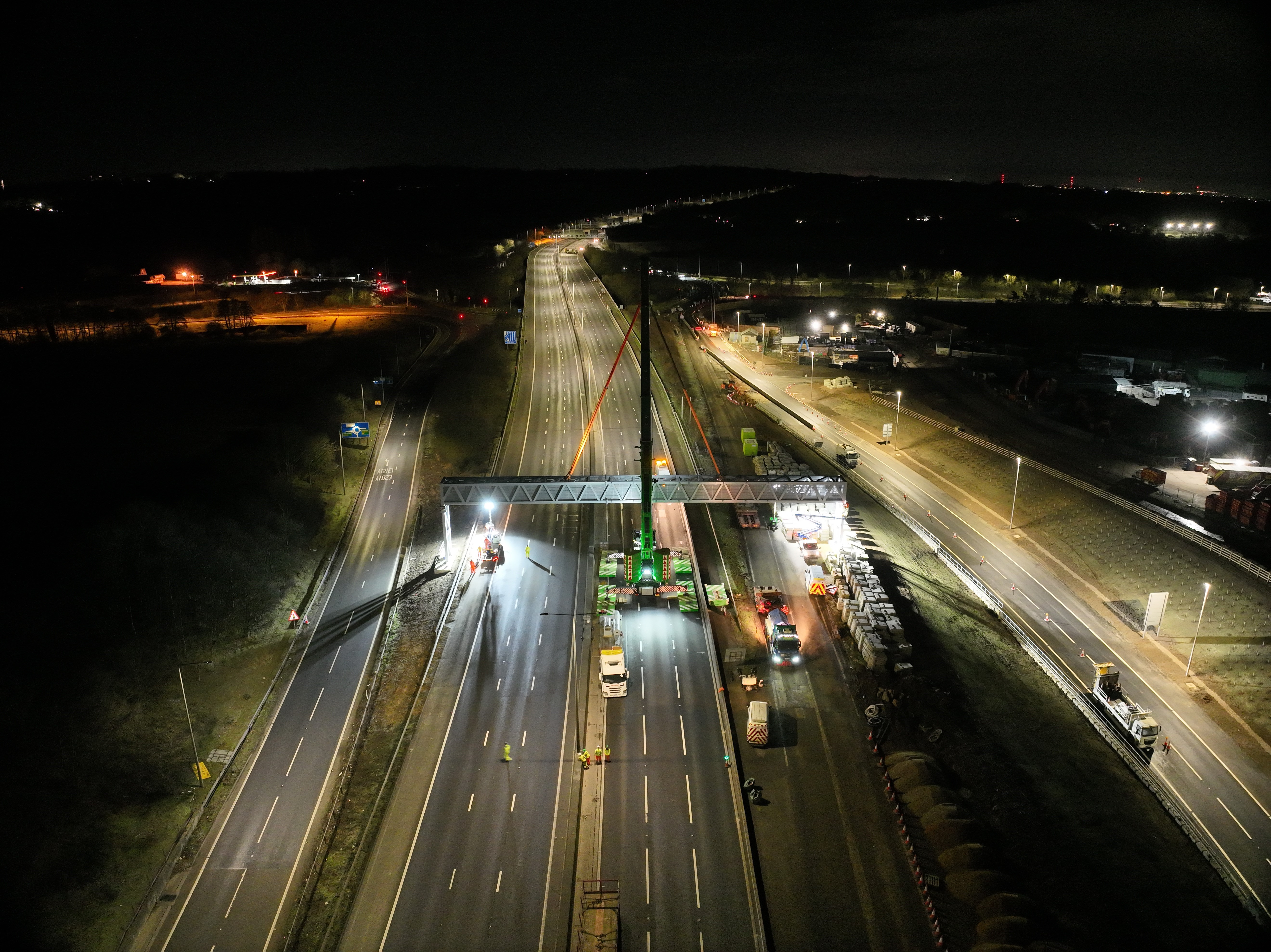
They were constructed off-site and delivered via an abnormal load escort, causing less disruption to traffic. When operational, the gantries will house signs which have the latest technology to keep road users informed and up to date.
Zachary Pepper, our Project Manager, said:
“This complex operation saw the completion of a series of improvements, allowing road users to safely navigate through this busy junction in the near future. We would like to thank the construction team and the support from the local community in reaching this significant milestone.”
Hugh McNally, GRAHAM Project Manager, said:
“Both super-span gantries were installed overnight during a full closure of the M25 in both directions and lifted into position by two 450-tonne mobile cranes, with the carriageway reopened in less than nine hours, keeping disruption to a minimum for road users.
“The safe and successful delivery was a result of precise planning by both the Project Team and supply chain. Well done to all involved.”
-
23 January 2025
Upcoming traffic management
A12 eastbound overnight closures
The A12 eastbound at the M25 junction 28 will be closed from Monday 20 January to Friday 24 January, 10pm – 5am each night, to allow us to complete the tie-in works on the slip road.
The A12 will be closed directly underneath the M25 junction 28 and Brook Street roundabout. During the closure, traffic will need to exit the A12 eastbound to join the Brook Street roundabout, where they can rejoin the A12 to continue their journey.
Thank you for your ongoing patience while we continue to deliver these works.
‘Superspan’ gantry installations
Two ‘superspan’ gantries are set to be installed over the M25 at junction 28 as part of our major improvements scheme. Spanning the entire width of the motorway carriageway, with one measuring 54m and the other 44m, they will display the overhead road signage and information.
For safety, the installations need an overnight closure of the M25 in both directions between junctions 27 and 28 from 10pm Saturday 25 January until 6am Sunday 26 January.
The M25 clockwise carriageway between junctions 27 and 28 will be closed from 10pm Saturday 25 January until 6am Sunday 26 January to undertake these works.
During the closure, please leave the M25 at junction 27 where a signed diversion will be in place via the M11, A406 North Circular, A12 Eastern Avenue, and the A12 Colchester Road, where you can re-join the M25 at junction 28.
The M25 anticlockwise carriageway between junctions 28 and 27 will be closed from 10pm Saturday 25 January until 7am Sunday 26 January.
During the closure, please leave the M25 at junction 28, where a signed diversion will be in place via the A12 Colchester Road, A12 Eastern Avenue, A406 North Circular Road, and the M11 Motorway, where you can re-join the M25 at junction 27.
When planning our road closures, the team liaises with Transport for London (TFL) to ensure that the ULEZ cameras are not in operation along the signed diversion route. However, if road users decide to leave our official signed diversion route during closures, they may still need to pay the ULEZ fee.
A12 westbound overnight closures
As part of our scheme, we are making improvements to the local Non-Motorised User (NMU) route, improving connectivity for those not using motorised vehicles between Harold Hill and Brentwood. Road closures are needed for these works.
The A12 westbound will be closed between the A12 junction 12 (Shenfield) and Maylands Way from 9pm to 5am on Monday 27 January and Tuesday 28 January.These closures are for traffic management to be installed, so that NMU route improvement works can start. This will include a lane closure on the A12 westbound on slip, and narrow lanes on the A12 westbound.
During these closures, to continue on the A12, please travel eastbound from junction 12 and join the A130 at the A12 junction 17, where a signed diversion will be in place via the A1245, the A127 to rejoin the A12 at Gallows Corner. Access for residents within the closure will be permitted via our traffic management personnel. Please approach our manned gates to be granted access.
When planning our road closures, the team liaises with Transport for London (TFL) to ensure that the ULEZ cameras are not in operation along the signed diversion route. However, if road users decide to leave our official signed diversion route during closures, they may still need to pay the ULEZ fee.
Please remember that closure details can change at short notice. For the most up-to-date information, please visit our daily closures page. Our travel alerts give details of live incidents on our network.
-
21 January 2025
Project moves a step closer to completion
Monday morning marked a significant milestone in our M25 junction 28 improvement project.
We've opened the new anticlockwise entry slip to traffic.
We designed the extended slip road to increase visibility. It allows merging traffic to build up to the National Speed Limit over a greater distance. This will make journeys safer for road users.
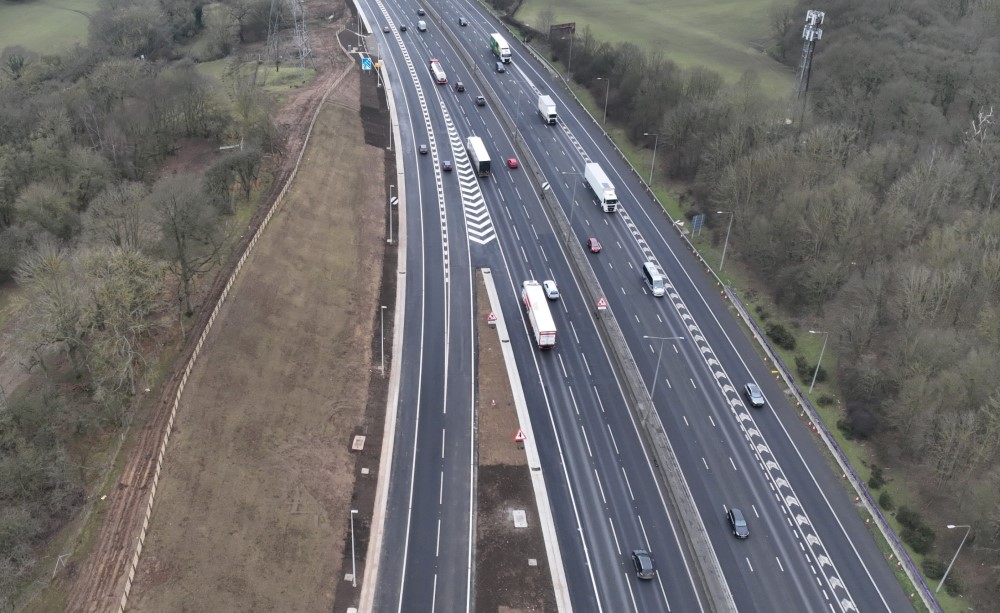
M25 junction 28 new entry slip National Highways Project Manager Zachary Pepper said:
“The opening of the new M25 anticlockwise on slip will not only ease current congestion and improve safety around the junction but will also allow the new loop road to be constructed in line with our summer 2025 completion date.
“I would like to thank GRAHAM, our delivery partner, and supply chain in supporting National Highways to reach this significant milestone.”
Hugh McNally, Project Manager at GRAHAM, said:
“The improved visibility and gradual merging will enhance the flow of traffic and reduce the risks of collisions on this major road network. This key milestone is a result of successful collaboration by the project team, client, and our supply chain. Our focus will now turn towards connecting the new Loop Road into the M25 mainline, ahead of completion in late summer 2025.”
Our improvement upgrades junction 28 between the M25 and the A12 in Essex. This will provide a safer, more efficient network for road users.
-
16 January 2025
Upcoming traffic management
Overnight M25 anticlockwise carriageway closure, junctions 29 to 27
The M25 anticlockwise carriageway will be closed overnight between junctions 29 and 27 on Tuesday 14 January to Friday 17 January (10pm-5am each night) and Sunday 19 January (10pm – 5am).During the closures, a signed diversion will be in place by:
- the A12 Eastern Avenue
- the A406 North Circular
- using the M11 to rejoin the M25 at junction 27.
When planning our road closures, we liaise with Transport for London (TFL) to ensure that the ULEZ cameras are not in operation along the signed diversion route. However, if road users decide to leave our official signed diversion route during closures, they may still need to pay the ULEZ fee.
M25 J28 anticlockwise entry slip weekend closure
The M25 junction 28 anticlockwise entry slip will soon be opening to traffic, providing safer and smoother journeys for our road users. This will be the first completed section in a series of improvements to junction 28.
To complete the construction and safely open the new M25 slip road, we will need to close the existing anticlockwise entry slip at junction 28 from 10pm Friday 17 January to 5am Monday 20 January.
During the closure, a signed diversion will be in place by following the M25 clockwise at junction 28 and re-joining the anticlockwise carriageway at junction 29.
A12 eastbound overnight closures
The A12 eastbound at the M25 junction 28 will be closed from Monday 20 January to Friday 24 January, 10pm – 5am each night, to allow us to complete the tie-in works on the slip road.
The A12 will be closed directly underneath the M25 junction 28 and Brook Street roundabout. During the closure, traffic will need to exit the A12 eastbound to join the Brook Street roundabout, where they can rejoin the A12 to continue their journey.
Thank you for your ongoing patience while we continue to deliver these works.
‘Superspan’ gantry installations
Two ‘superspan’ gantries are set to be installed over the M25 at junction 28 as part of our major improvements scheme. Spanning the entire width of the motorway carriageway, with one measuring 54m and the other 44m, they will display the overhead road signage and information.
For safety, the installations need an overnight closure of the M25 in both directions between junctions 27 and 28 from 10pm Saturday 25 January until 6am Sunday 26 January.
The M25 clockwise carriageway between junctions 27 and 28 will be closed from 10pm Saturday 25 January until 6am Sunday 26 January to undertake these works.
During the closure, please leave the M25 at junction 27 where a signed diversion will be in place via the M11, A406 North Circular, A12 Eastern Avenue, and the A12 Colchester Road, where you can re-join the M25 at junction 28.
The M25 anticlockwise carriageway between junctions 28 and 27 will be closed from 10pm Saturday 25 January until 7am Sunday 26 January.
During the closure, please leave the M25 at junction 28, where a signed diversion will be in place via the A12 Colchester Road, A12 Eastern Avenue, A406 North Circular Road, and the M11 Motorway, where you can re-join the M25 at junction 27.
When planning our road closures, the team liaises with Transport for London (TFL) to ensure that the ULEZ cameras are not in operation along the signed diversion route. However, if road users decide to leave our official signed diversion route during closures, they may still need to pay the ULEZ fee.
Please remember that closure details can change at short notice. For the most up-to-date information, please visit our daily closures page. Our travel alerts give details of live incidents on our network.
-
13 January 2025
Traffic management update
M25 J28 anticlockwise entry slip weekend closure
The M25 junction 28 anticlockwise entry slip will soon be opening to traffic, providing safer and smoother journeys for our road users. This will be the first completed section in a series of improvements to junction 28.
To complete the construction and safely open the new M25 slip road, we will need to close the existing anticlockwise entry slip at junction 28 from 10pm Friday 17 January to 5am Monday 20 January.
During the closure, a signed diversion will be in place by following the M25 clockwise at junction 28 and re-joining the anticlockwise carriageway at junction 29.
M25 overnight closure for gantry installation
A new overhead super-span gantry will be installed over the M25 at junction 28. The installation will require an overnight closure of the M25 in both directions between junctions 27 and 28. These closures will require two different diversion routes for road users to follow, depending on the direction they are travelling.
The M25 clockwise carriageway between junctions 27 and 28 will be closed from 10pm Saturday 25 January until 6am Sunday 26 January to undertake these works.
During the closure, please leave the M25 at junction 27 where a signed diversion will be in place via the M11, A406 North Circular, A12 Eastern Avenue, and the A12 Colchester Road, where you can re-join the M25 at junction 28.
The M25 anticlockwise carriageway between junction 28 and 27 will be closed from 10pm Saturday 25 January until 7am Sunday 26 January.
During the closure, please leave the M25 at junction 28, where a signed diversion will be in place via the A12 Colchester Road, A12 Eastern Avenue, A406 North Circular Road, and the M11 Motorway, where you can re-join the M25 at junction 27.
When planning our road closures, the team liaises with Transport for London (TFL) to ensure that the ULEZ cameras are not in operation along the signed diversion route. However, if road users decide to leave our official signed diversion route during closures, they may still need to pay the ULEZ fee.
-
08 January 2025
Upcoming junction 28 traffic management
We'll soon be finalising the new M25 anticlockwise entry slip and A12 carriageway renewals.
Closures
To work safely, we'll need the following weekend and overnight road closures.
11pm Friday 10 January to 5am Monday 13 January - M25 junction 28 anticlockwise entry slip weekend closure
During the closure, a signed diversion will be in place by:
- joining the M25 clockwise at junction 28
- then leaving the M25 at junction 29 to travel anticlockwise.
Tuesday 14 January to Friday 17 January - M25 anticlockwise carriageway closed overnight (10pm-5am each night) between junctions 29 and 27
During the closure, a signed diversion will be in place by:
- the A127 Eastern Avenue
- the A406 North Circular
- using the M11 to rejoin the M25 at junction 27.
When planning our road closures, we liaise with Transport for London (TFL) to ensure that the ULEZ cameras are not in operation along the signed diversion route. However, if road users decide to leave our official signed diversion route during closures, they may still need to pay the ULEZ fee.
Please remember that closures can change at short notice. You can check the latest information on our daily closures page or find live travel information on our Traffic England. Our travel alerts give details of live incidents on our network.
-
30 December 2024
2024 Highlights
As we approach the final year of construction, let’s take a moment to look back on the significant strides made on the scheme this year, as we work to provide a safer, more integrated network for road users.
Structures
- The majority of major works on all four bridge structures have been completed.
- The installation of six steel girders for Duckwood Bridge, measuring 40 metres in length and weighing up to 113 tonnes, the largest beam lift of the scheme.
- Successfully installed 27 precast concrete units to extend the Grove Brook culvert, using 650 and 150 tonne cranes to expertly lift them into place.
- Completion of all utility’s diversions, such as mains water, power, sewage and communications.
- The gantry bases have been constructed in readiness to install two new overhead gantries, spanning the width of the M25 carriageway.
Earthworks
- Constructed 15 concrete earth retaining walls, known as RECo walls. These are comprised of prefabricated concrete panels, designed to build space efficient earthwork retaining walls.
- Shaped the landscape for the new two-lane loop road that will link the M25 to the A12.
Landscape
- The scheme's extensive landscaping plans continue, with the planting of 21,000 trees and shrubs to commence in January 2025.
- Completion of 3 attenuation ponds across the scheme. These are used to retain and slowly release rainwater in a storm, to not overload our surrounding rivers.
Roads
- Surfacing of the new M25 B Track Entry Slip has been completed this month, including line painting, in readiness for traffic to be switched over early in the New Year.
- The A12 Eastbound Exit Slip is now partially surfaced, with finishing works including street lighting, safety railings, before the new slip road can be opened in the New Year.
We would like to thank everyone for their patience and support whilst we continue to deliver these much needed improvements.
The project team would like to wish you a Merry Christmas and a Happy New Year!
-
20 December 2024
One more Christmas story from the team
Not content with the massive food and essentials collection they did, the team has now been busy at the Harold Hill Christmas Light event in Essex.
They made sure all visitors to Santa's grotto had a little gift to mark their visit. This is the second year they've supported this event.

Santa's Grotto at the the Harold Hill Christmas Light event in Essex -
10 December 2024
Christmas at Junction 28
As we start the Christmas countdown, we’ve not only been busy on the road.
We’ve also been getting serious about collecting food and gifts for local people.

Members of our team at Trussell Trust's Brentwood foodbank We’ve been rounding up donations for the Trussell Trust in Brentwood, including:
- toys for children
- food
- household essentials
We’d like to say a big ‘thank you’ to everyone who contributed to our collection.
We love making a difference to the people we’re working so close to at junction 28.
It’s important that we leave a legacy beyond the road. This is one of the ways we can do that.

Some of the donations we collected for the Trussell Trust -
26 September 2024
Celebrating health and safety milestone
The project team has celebrated a health and safety milestone: 650,000 hours without any reportable or Lost Time Incidents (LTI).
This fantastic achievement was made possible through the commitment of our staff and supply chain on retaining a safe environment for everyone.
To mark the occasion, the team held a safety stand down and invited the site team to the main compound for a presentation on the upcoming high-risk activities planned as they work towards completion. They finished the day with a tasty barbecue to recognise the achievement.
National Highways Project Manager Zachary Pepper said: “It is a great achievement for the project to reach this milestone, which marks the significance of health and safety on site.
“The work completed by the integrated project team, including the construction team, suppliers and subcontractors, embeds the focus on the Home Safe and Well promise.”
GRAHAM Project Manager Hugh McNally said: “Significant progress has been made on the project over the last two years and this achievement is a direct result of everyone’s commitment to safety on the scheme. We now refocus to ensure we continue to deliver the project safely and successfully to completion in summer 2025.”

-
19 September 2024
Upcoming traffic management
A12 eastbound and M25 anticlockwise entry slip overnight closure - 21 September
We'll close the A12 eastbound from Gallows Corner to the M25 Junction 28 overnight on Saturday 21 September from 10pm-5am.
This is so our team can safely move and install temporary safety barriers.
During the closure, the M25 junction 28 anticlockwise entry slip will also be closed.
We'll maintain local access for residents with properties on the A12.
However, there'll be no access for through traffic during this closure.
Diversion Routes
To join the M25 anticlockwise from Gallows Corner
Use the A127 eastbound to join the anticlockwise carriageway at M25 junction 29.
You can also use this diversion to join the A12 eastbound by leaving the anticlockwise carriageway at junction 28.
To join the M25 anticlockwise carriageway from the A12 westbound
Join the M25 junction 28 clockwise and do a U-turn at junction 29.
Non motorway traffic heading to the A12 eastbound from Gallows Corner should follow our signed diversion route by:
- the A127
- Squirrels Heath Road
- Shepherds Hill
- Nags Head Lane.
Please remember that closures can change at short notice. You can check the latest information on our daily closures page or find live travel information on our Traffic England site. Our travel alerts give details of live incidents on our network
30 August 2024
Clockwise exit slip road closures
We are closing one slip road from junction 28 over the following weekends:
- Friday 6 September 11pm to Monday 9 September 5am
- Friday 13 September 11pm to Monday 16 September 5am
When we close the clockwise exit slip road, it means you can still travel through the junction itself.
However, if your journey involves leaving the M25 at junction 28, you won’t be able to do so.
Please note that the M25 remains open despite the exit slip being closed.
During the closure, to reach the M25 junction 28 interchange from the M25 clockwise:
- continue on the M25 clockwise
- exit at junction 29
- return by the M25 anticlockwise to junction 28
Please remember that closures can change at short notice. You can check the latest information on our daily closures page or find live travel information on our Traffic England site. Our travel alerts give details of live incidents on our network.
11 July 2024
Removing existing overhead gantries
We were unable to safely remove the existing overhead gantries on the M25 as originally planned during our closure of the M25 at junction 28 in June.
Fortunately we still used the time to complete a lot of other work while the road was closed.
We will now remove the gantry during a full overnight closure (10pm to 7am) of the M25 clockwise between junctions 27 and 28 in late July.
Please remember that closure details can change at short notice. For the most up-to-date information, please visit our daily closures page.
Clockwise diversion
A diversion will be in place via M11, A406, and A12, where you can re-join the M25 at junction 28.
Anti clockwise diversion
A diversion will be in place via the A12, A406 and M11, where you can re-join the M25 at junction 27.
28 June 2024
A12 lane closures
Works on site are progressing well, and we're ready to divert a sewer on the A12 between Maylands Golf Club and Maylands Way.
For safety, there will be lane closures on the A12 and no direct access from the A12 to Maylands Way from July to September.
Closures can change at short notice. Make sure you check the latest information on our daily closures page.
Closure locations
- A12 eastbound from Woodstock Avenue to our site compound
- A12 westbound from the A12 entry slip to Maylands Way
Maylands way
There will be no direct access into Maylands Way from the A12. A signed diversion will be in place and pedestrian access will be maintained.
-
12 March 2024
Scheme celebrates 400,000 safe working hours
We recently celebrated 400,000 hours worked on the scheme without a Lost Time Incident (LTI).
LTI is a standard measure within the construction industry, and relates to accidents that requires a person to take time off work.
We caught up with project manager Zach to find out more: “This is a fantastic achievement, and testament to the continual focus we and our construction partners put on creating a safe environment for everyone who works on or visits our site.”
“The majority of our work is within a busy and complex site; and we’re continuously reviewing and improving safety to reduce any risks and ensure everyone goes home safe each and every day.”
-
23 January 2024
What’s coming up on the scheme this year
As we start a key year of construction on the project, we thought we’d take a look at what work we’ll be carrying out over the next couple of months.
The winter weather faced so far this year has not dampened progress being made across the scheme.
We’re currently building the RECo walls, concrete earth retaining walls that were manufactured to allow a more space efficient way to build, which will form the new A12 eastbound exit slip and take traffic over the Maylands Bridge to cross the loop road, M25 anticlockwise and A12 eastbound up to the junction.
Work will start soon on the M25 clockwise between junctions 27 and 28, with the installation of the concrete foundations for the new overhead gantry.
We will be continuing with our work to shape the landscape for the construction of the new two-lane loop road that will link the M25 to the A12.
Additionally, we are looking forward to our final bridge beam lift on the scheme for the new Duckwood Bridge in February. Ahead of the lift, we’ll be finishing off work on the concrete abutments – the foundations the beams will sit on.
We’ll be posting the latest information here as work progresses.
-
20 December 2023
‘Beam me up’
We’re beaming with pride as last week saw us successfully complete our last beam lift of the year, and our third on the scheme.
Sixteen pre-cast concrete beams were lifted into place for the new Alderwood Bridge. Measuring 23.5 metres and weighing 35 tonnes each (that’s around the same as 117 reindeers!), the beams were lifted onto the newly built concrete supports.
Located close to the M25, Alderwood Bridge is one of four new bridges, and once complete it will carry the new loop road between the M25 and A12 over the new M25 entry slip.
This lift follows closely on from nine pairs of steel beams, weighing up to 56 tonnes (that’s more than 187 reindeers!) and measuring 48 metres in length being lifted into place to form the base of the new Maylands Bridge.
Maylands Bridge will form part of the new A12 eastbound exit slip and will take traffic over the new Grove Bridge and loop road that are currently under construction.
And as good things come in threes, we also recently installed six 70-metre beams that form the base of the new Grove Bridge. Due to overhead power cables, these beams were lifted into place using two specialist mobile cranes, known as modular transporters.
With all the action happening within our site between the A12 and the M25, here’s our trio of bridge lifts condensed into just over three minutes.
These lifts round off 2023 as we work to improve this busy junction. We’ve made fantastic progress across the entire scheme, and you may have noticed lots of changes above ground, with piling machines, beam lifts, culverts installed, and the landscape being reshaped within our site between the M25 and A12.
There has also been a lot happening below ground, with our tunnel boring machine Tina helping divert a gas main, other service pipes and cables being moved, and protection installed over a fuel line.
From the entire team we would like to wish you a fantastic festive break and a happy 2024.
-
08 November 2023
Scheme achieves two big milestones
The first saw six 70-metre beams moved into place within our site between the M25 and A12 for the Grove Bridge – as our first lift, this is a significant milestone for the scheme. These beams form the base of the Grove Bridge road deck, which will carry the new loop road underneath the Maylands Bridge – the new A12 eastbound exit that is currently being constructed.
The beams were lifted into place in pairs using two specialist mobile cranes, known as modular transporters, due to overhead cables.
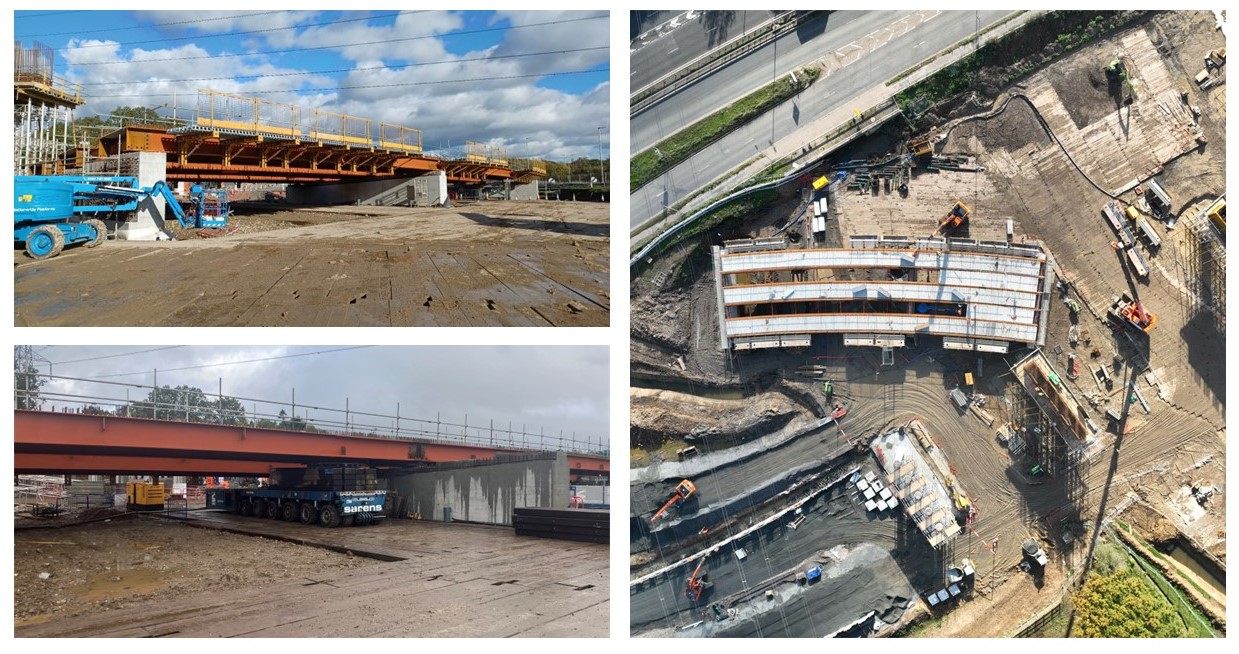
With a crane positioned on the M25-anticlockwise carriageway over two nights, we also moved eight large concrete blocks into place. These pre-made rectangular sections will form the new Weald Brook culvert, which will help divert the brook so we can widen the M25 entry slip road. And the good news – this lift was completed ahead of schedule, and we were able to reopen the M25 for traffic early on Sunday morning.
Scheme rated as excellent
Our project has once again achieved top marks and rated ‘excellent’ by the Considerate Constructors Scheme (CCS).
CCS is an independent organisation that aims to raise standards within the construction industry by promoting and supporting construction schemes in their efforts to care for the environment, local community, and their workforce.
Following our most recent visit by the independent assessor, the project gained top marks in all three categories – Respect the Community, Care for the Environment and Value the Workforce – and once again scored a maximum score of 45/45.
The assessor praised the project for: “…continuing to conform to the CCS Code of Considerate Practice to an excellent standard. Community communication and support arrangements remain very comprehensive and appearance standards are very high. It is great to see the progress in the site's social value plans and the wide range of community support and engagement activities that have been undertaken to date.”
Project manager Zach said: “I’m delighted that we’ve once again achieved top scores across the board from the Considerate Constructor Scheme. And having just achieved our first bridge lift – a significant milestone for the project – it’s great recognition of all the hard work that everyone is putting in to deliver this project safely, with consideration to those around us, road users and the environment.”
Project information
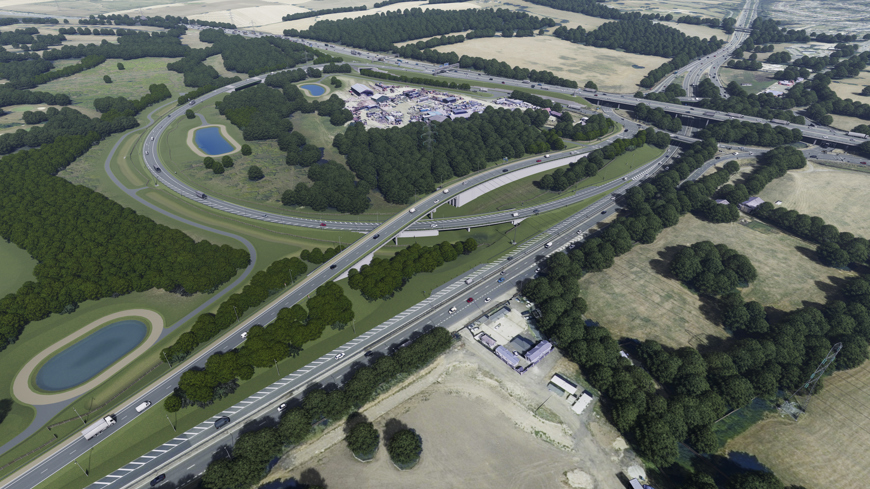
M25 junction 28 visualisation
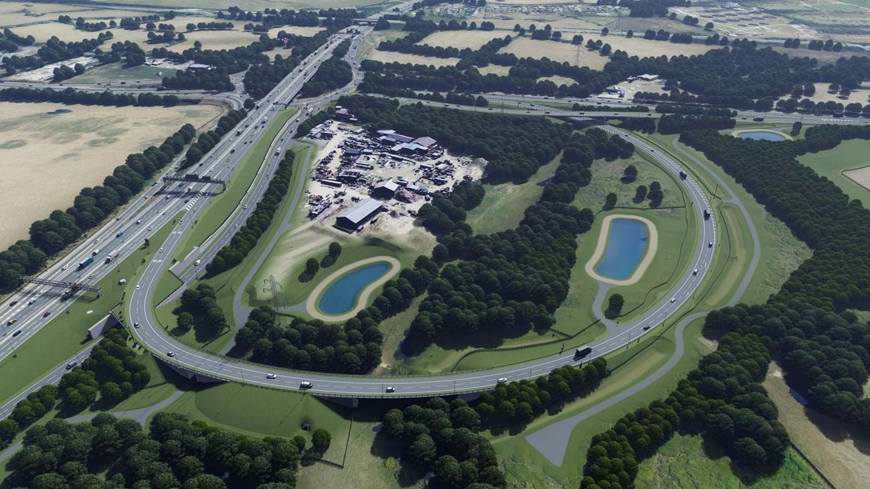
M25 junction 28 visualisation - M25 anti-clockwise to A12 eastbound loop road
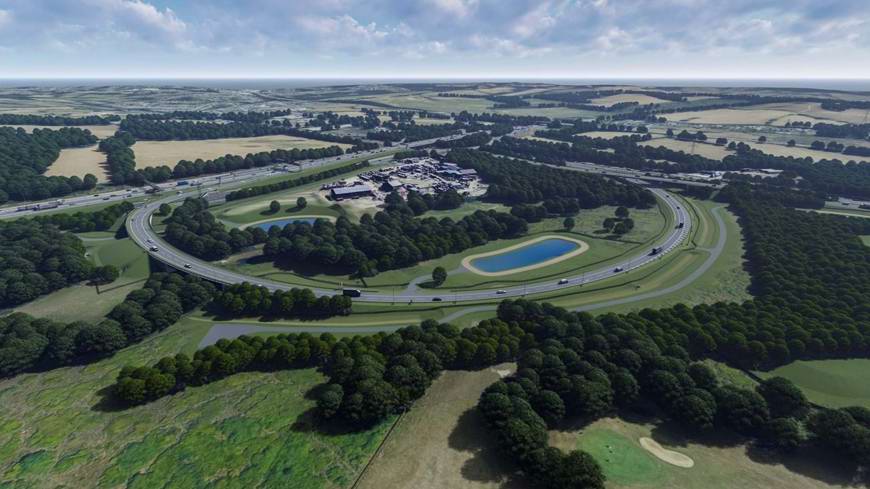
M25 junction 28 visualisation - M25 anti-clockwise to A12 eastbound loop road
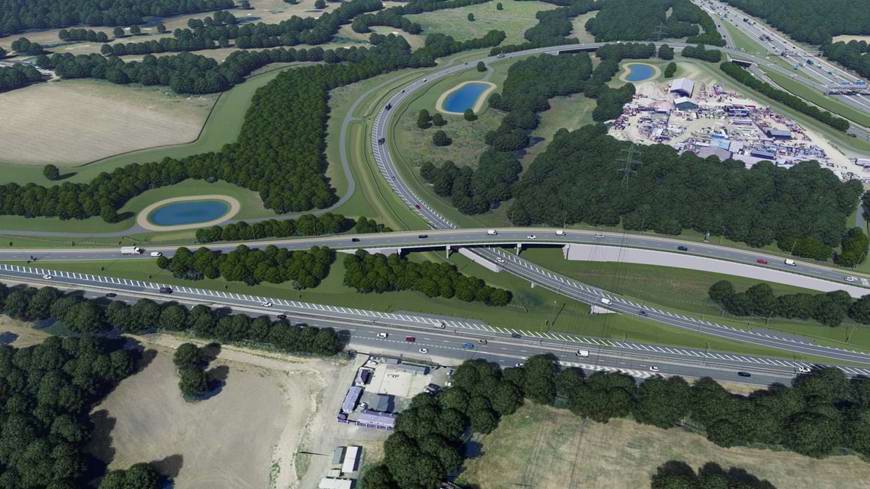
M25 junction 28 visualisation - A12 exit
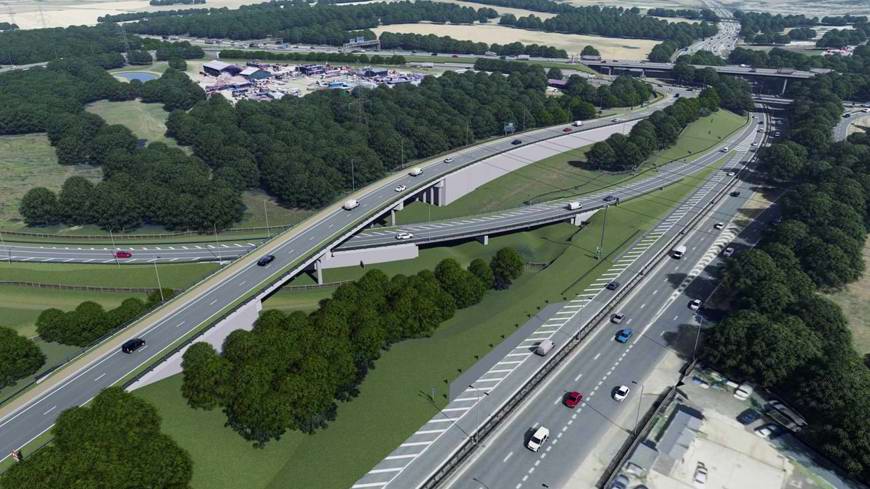
M25 junction 28 visualisation - A12 exit
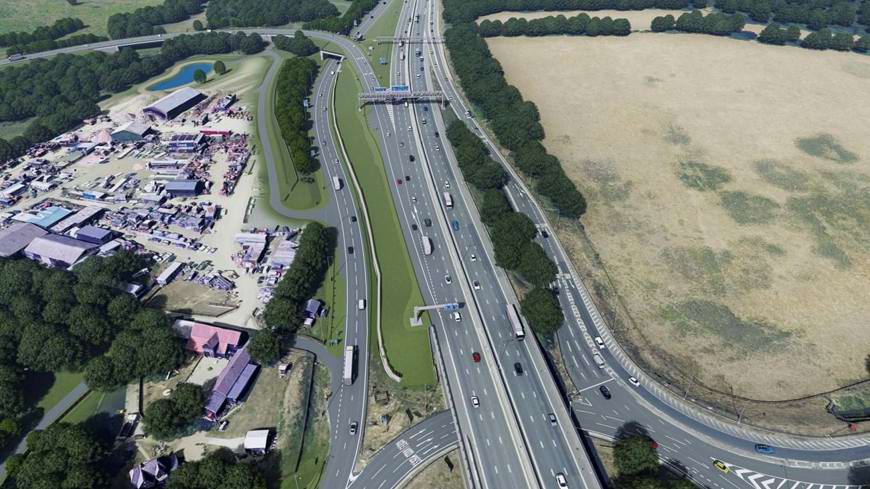
M25 junction 28 visualisation - M25 anti-clockwise on and off slip
Modal with carousel

M25 junction 28 visualisation

M25 junction 28 visualisation - M25 anti-clockwise to A12 eastbound loop road

M25 junction 28 visualisation - M25 anti-clockwise to A12 eastbound loop road

M25 junction 28 visualisation - A12 exit

M25 junction 28 visualisation - A12 exit

M25 junction 28 visualisation - M25 anti-clockwise on and off slip
Overview
The M25 junction 28 plays a huge role in connecting the A12 and the M25, as well as providing access to Brentwood via the A1023. Up to 7,500 vehicles pass through the junction roundabout at peak times.
As it is operating at capacity, vehicles using the junction face congestion and delays, which effects local air quality. Our research shows that traffic is expected to increase in the area by around 30% by 2037, which means that over 9,000 vehicles could be passing through it by this date.
Our improvements include:
- building a new two-lane loop road, for traffic travelling from the M25 anti-clockwise onto the A12 eastbound (towards Brentwood). This will include the construction of new bridges to take the loop road over or under the other road links, and the Weald Brook; new signage and changes to the landscape
- changing the position of A12 eastbound exit slip road and M25 anti-clockwise entry slip road to allow for the new loop road
- widening the M25 anti-clockwise carriageway to provide more space for traffic leaving for the A12 eastbound
An improved junction for everyone - non-motorised user route
Our aim is to provide safer and smoother journeys for everyone as they make their way through the junction. This includes non-motorised user (NMU) forms of transportation, such as walking, cycling and wheeling.
As a part of the M25 junction 28 improvement scheme, we’re upgrading the existing NMU footpath between Harold Wood and Brentwood. This will improve accessibility for pedestrians and cyclists by allowing a safe crossing through the Brook Street roundabout.
Upgrades also include widening the path along the A12, including the corner of Maylands Way.
As you may have noticed while travelling through this junction, works are progressing on the NMU route, along the A12 Westbound carriageway. Lane closures are required to complete these NMU works, on the A12 westbound on-slip road and narrow lanes on the A12 westbound. This is to allow a safe working distance for our construction team.
M25 junction 28 fly through
To find out more about our scheme watch this short video:
Benefits
Our improvement scheme will:
- Increase capacity and reduce congestion at the junction and on the approaches and exits
- Improve safety by redesigning the existing roundabout layout and reducing traffic levels
- Provide better connections between the M25 and A12
- Reduce annual collision rates through additional capacity
- Improve average journey times and reliability for all passing traffic through the junction
- Minimise the impact of air and noise pollution in the local area by smoothing the traffic flow
- Reduce traffic queuing back onto the M25
- Help economic growth in the area by providing improvements to cater for future traffic demands
Our work in the local community
We want to make a positive difference for communities living near our roads, especially where we’re carrying out works.
Find out more about our work in the local community.
We value your feedback
Visit our M25 Junction 28 feedback tool to have your say. The tool includes an interactive map. You can click on a location to make a specific comment, or give us your general feedback.
ECHO is a one-way feedback tool, so if you’d like a response to your feedback you should email the project team at: m25j28@nationalhighways.co.uk
Documents
DCO requirements documents
The Development Consent Order (DCO) process was established by the Planning Act 2008 and is used for certain large and complex schemes (including highway improvements) that have been designated as a Nationally Significant Infrastructure Project (NSIP) by the Government.
The Secretary of State for Transport granted the Development Consent Order (DCO) for the M25 junction 28 improvements on 16 May 2022. Links to key DCO documentation can be found below:
- Examining Authority’s report and recommendations to the Secretary of State for Transport
- Secretary of State for Transport’s decision letter and statement of reasons
- Development Consent Order as made by the Secretary of State for Transport
You can view our full Development Consent Order application on the Planning Inspectorate website.
This includes documents identified under Article 43 and Schedule 9 of our Development Consent Order, which have been certified as true copies by the Secretary of State.
Development Consent Order – Requirements Register
Requirements are conditions that have been included in the DCO, which control how the project must be implemented (constructed and maintained). Implementing the DCO in accordance with these conditions involves completing consultation and approval processes that have been defined in the DCO. These processes are referred to here and in the DCO as “discharging” the requirements.
This Requirements Register is a live document and will be updated as the process to discharge the requirements progresses.
The latest version will always be published below:
View the Requirements Register.
This register will be maintained for three years following completion of the project. The register sets out:
- each requirement
- whether the requirement needs approval by the Secretary of State (or other duty holder)
- whether any approval has been applied for or given
Requirements documents
- Requirement 3 - Detailed Design Report
- Requirement 4 - Construction Environment Management Plan
- Requirement 5 - Landscape and Ecological Management Plan
- Requirement 6 - Contaminated Land and Groundwater
- Requirement 7:
- Requirement 8 - Drainage Strategy
- Requirement 9 - Archaeological Remains
- Requirement 10 - Traffic Management
- Requirement 11 - Trees protection - Arboriculture method statement
- Requirement 13 - Fencing
- Requirement 16 - Site Specific Plan for Grove Farm
- Requirement 19 - Gardens of Peace Muslim Cemetery
Traffic information
Information about scheduled roadworks and events on our motorways and major roads.Sign up for updates!
Keep up to date with what's happening on this scheme by signing up to our updates.
